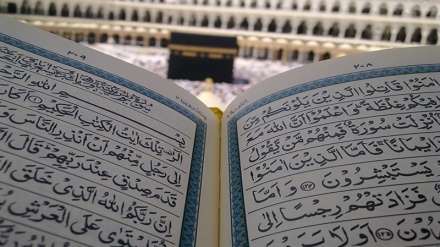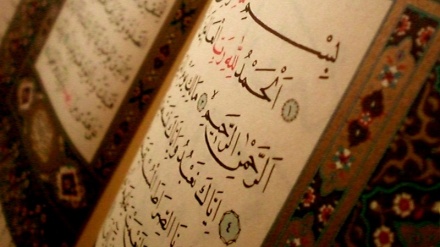Path towards Enlightenment (1037)
Welcome to our latest episode of “Path towards Enlightenment”, which is an endeavour to make you and us familiar with an easy and fluent explanation of God’s Final Scripture to all mankind, the holy Qur’an that was revealed to the Last and Greatest of all Messengers, Prophet Mohammad (blessings of God upon him and his progeny).
In today’s episode we will complete explanation of “Surah Ma’arej” which we had started a few weeks ago. Number 70 in the serial order of compilation of the holy Qur’an, this Surah has 44 Ayahs and was revealed in Mecca although according to exegetes, some of its Ayahs were revealed in Medina. The title of the Surah derives from the word “Ma’arej” mentioned in Ayah 3 regarding the places of ascent or lofty stations where by the permission of the Almighty Creator angels can ascent. The Surah focuses on the Day of Resurrection and warns the polytheists and disbelievers of the dire consequences of their lack of faith, while defining the characteristics of the peoples of Paradise and Hell. The opening Ayahs concern the sending down of torments in this world such as the one that befell a denier of the Divinely-designated Wilayah or Leadership of the Prophet’s Immaculate Cousin and Son-in-Law, Imam Ali ibn Abi Taleb (AS).
We start from where we left you last week, and here are Ayahs 36, 37, 38, and 39:
“What is the matter with the faithless that they scramble toward you?
“From the right and the left in batches;
“Does each man among them hope to enter the garden of bliss?
“Never; We indeed created them from (base matter of) what they know!”
If you might recall, in our explanation of the previous Ayahs of this Surah last Friday, we said belief in the Day of Resurrection and the Final Judgement is the key to salvation, and thus a true believer is always cognizant of God Almighty, while aware of the rights of others in his/her wealth, especially of the poor and the needy, since the path to Paradise is adherence to Divine decrees, observance of the ritual prayers, abstinence from sins, and positive interaction with others.
The Ayahs that we recited to you now point to the wishful thinking of the polytheists and other disbelievers that their better standard of life in the world will ensure for them a place in Paradise, in case there is the Resurrection Day – in which they do not actually believe while scoffing at the concept of Paradise.
So, what makes the sinners and disbelievers who lead a deprave and desultory life think of themselves as superior to others, when they know fully well that all human beings are created from a worthless and unclean drop and it is only the correct set of beliefs, coupled with virtuous deeds, rather than wealth, that ensures salvation in the Hereafter!
From these Ayahs we learn that:
- The unmatched eloquence and timeless wisdom of the Holy Qur’an made even those who mocked and belied the Prophet to listen to its recitation – not out of belief but in the wishful longing for Paradise (on the basis of their wealth and power).
- A true believer is never boastful of his deeds and is always humble before the Almighty Creator.
- Arrogance and vanity are restrained when a person thinks of his/her common origin from a worthless and unclean drop of liquid.
Now we invite you to listen to Ayahs 40 and 41 of the same Surah:
“Therefore, I swear by the Lord of the Easts and the Wests that We are able;
“To replace them by better than them, and We are not to be outmaneuvered.”
Here Allah swears by the easts and the wests in plural rather than singular form, in order to emphasize the different points of sunrise and sunset every day of the year, which is obvious for anyone keen on scientific calculations of the cardinal points that become fully evident even for ordinary persons at the time of the winter and summer solstices when the sun reaches its zenith in the Tropic of Cancer and the Tropic of Capricorn respectively. Besides these two distinct solstices on December 22 and June 21 which mark the longest night and the longest day (vice versa in the southern hemisphere), there are two spring and autumn equinoxes on March 21 and September 22 respectively when the day and the night are of equal duration. These scientific facts in accordance with the Earth’s orbit around the Sun as it rotates on its axis were proven by the Holy Qur’an over 14 centuries ago.
This is to awaken human conscience to the Power of the Almighty Creator Who, as the next Ayah says can easily replace the wrongdoers with better ones, and is able to resurrect all humanity from even scattered bones and dust for the Judgement Day.
These Ayahs teach us the following points:
- The Holy Qur’an, though not a book of astronomy, mentions scientific facts with accuracy in order to point to the spherical shape of Planet Earth and its orbit round the sun.
- We must never consider ourselves better than others thinking that Allah has not created anyone superior to us, since He is able to replace us by others.
In conclusion of this week’s episode of Path towards Enlightenment, let us listen to Ayahs 42, 43, and 44 marking the end of Surah Ma’arej as well:
“So leave them to gossip and play until they encounter their day, which they are promised:
“The day when they emerge from the graves, hastening, as if racing towards a target,
“With a humble look [in their eyes], overcast by abasement. That is the day they had been promised.”
These closing Ayahs of Surah Ma’rej warn the obdurate disbelievers who mock the Prophets, their moral guidelines, and the Day of Resurrection, of the terrible shock in store on the Promised Day, when mankind will emerge from the graves and race in a bewildered state. The Prophet is asked to leave the intransigent disbelievers to their fate after his relentless endeavours to awaken their conscience through presentation of rational facts.
On the Day of Resurrection, the disbelievers will be the real losers, with their eyes lowered with fear owing to the intensity of horror of the surroundings with humility while they shall be enwrapped by ignominy and humility.
From these Ayahs we learn the following points:
- Guidance is necessary till a certain stage after which the intransigent disbelievers should be left to their own fate.
- Emergence from the graves means physical resurrection of all the dead.
- The Day of Resurrection has been promised with certitude by the Almighty Creator, so we ought to be prepared for it through good deeds.
Next week we will start with surah Nooh, which refers to the mission of Prophet Noah. Goodbye and God bless you.
RM/AS/SS


